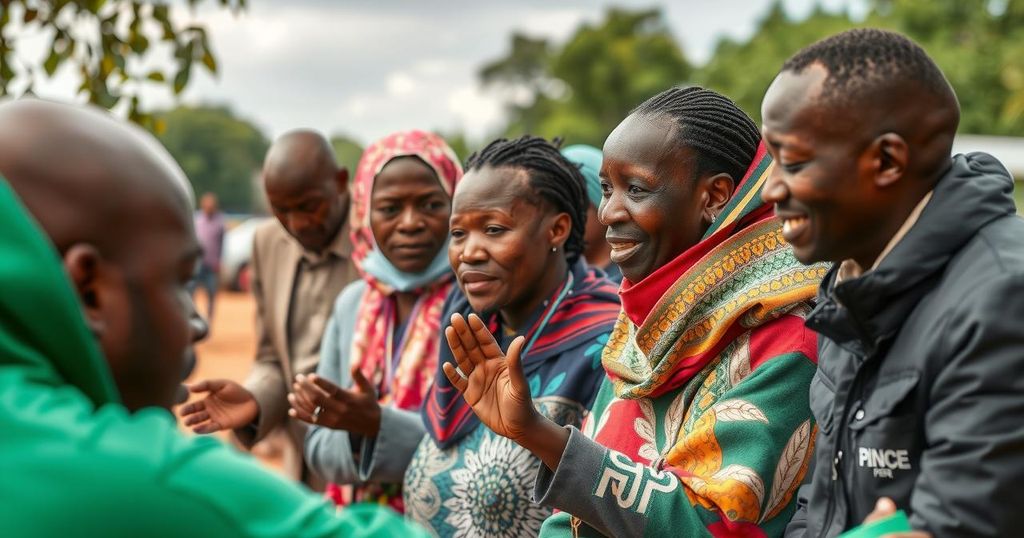The province of Ituri in the DRC has faced years of inter-ethnic conflict, particularly between the Lendu and Hema communities. This violence stems from historical rivalries exacerbated by external influences and resource exploitation. Despite the turmoil, local peace initiatives are emerging, driven by former combatants and community members seeking reconciliation. Integrated approaches, including military efforts and socio-economic programs, are being implemented to restore peace, although significant challenges remain.
For over a decade, the province of Ituri in the eastern Democratic Republic of Congo (DRC) has been engulfed in inter-ethnic violence, primarily between the Lendu and Hema communities. This turmoil is exacerbated by geopolitical dynamics and criminal interests driven by the region’s rich mineral resources, particularly gold. Although this instability has caused significant suffering, it has also prompted local initiatives aimed at fostering reconciliation and peace across communities.
The historical roots of the conflict date back to longstanding rivalries between the Hema, traditionally herders, and the Lendu, primarily farmers. Access to land and resources has fueled antagonism, which has worsened due to the political and economic instability in the region following the wars that impacted the DRC.
Moreover, outside influences have contributed to the unrest, as various national and international actors often exploit these ethnic divisions for resource extraction, further complicating the situation. The breakdown of state authority in certain areas has compelled the youth to resort to arms as a means of community defense.
Despite the trauma inflicted by years of strife, community-led initiatives have emerged to promote dialogue and peace. Elle Alphonsine Cecile, a former combatant who witnessed the devastating consequences of violence, chose to disarm and work for reconciliation. She expressed her regret over her past decisions and emphasized the potential for a stable future amidst ongoing challenges. “It was the absence of peace that drove us to take up arms. Today, I regret my actions. Living conditions remain precarious, but I believe that a future of stability is possible,” she articulated.
This journey towards peace is collective, with local groups organizing dialogue forums that encourage former adversaries to engage in constructive dialogue. Both Cecile and fellow initiative participant Ngabu Jospin reflect this spirit, as they work together on community projects to build trust and cooperation. As Jospin noted, “Peaceful coexistence is better than unnecessary conflicts that plague the region.”
To address the complex peace-building process, Congolese authorities, alongside international organizations, have implemented a multi-pronged strategy that includes military intervention, disarmament programs, and socio-economic reintegration for former combatants. Security efforts by the Congolese armed forces have reclaimed previously controlled territories, fostering inter-community cooperation in places like Diango, which is now witnessing former enemies unite as committed citizens engaged in peaceful coexistence.
However, significant hurdles still impede lasting peace, including persistent ethnic violence and a humanitarian crisis characterized by food insecurity and inadequate healthcare access. Ethnic divisions continue to be manipulated by political and economic entities, undermining reconciliation. National deputy Gracien Iracan de Saint-Nicolas emphasized the necessity for state institutions to restore confidence among the populace and address corruption to advance peace.
Local associations play a vital role in promoting dialogue and dismantling ethnically biased prejudices. Groups such as the Union des associations culturelles pour le développement de l’Ituri actively engage in community projects that bolster inter-ethnic coexistence. Women’s groups also contribute significantly, often being at the forefront of reconciliation initiatives, as they transform their suffering into a catalyst for positive change.
The Iturian diaspora likewise plays a crucial role, offering support through funding and international advocacy for enduring peace. To envision a peaceful future for Ituri, it is imperative that local initiatives receive comprehensive support at both national and international levels, alongside establishing transitional justice mechanisms and enhancing state capacity to ensure stability.
In conclusion, while challenges remain formidable, stories of resilience and solidarity illustrate a hopeful path forward for Ituri, potentially transforming it from a landscape of violence into a beacon of peaceful coexistence in Central Africa. Through collaborative dialogue and development initiatives, communities are pioneering a future that transcends the constraints of their historical grievances.
The article discusses the ongoing conflict in Ituri province, eastern DRC, and the community efforts aimed at restoring peace. It highlights the historical context of ethnic tensions between the Hema and Lendu groups, driven by competition for land and resources. The piece also examines the impact of external influences, the breakdown of state authority, and the resulting humanitarian crisis. Furthermore, it emphasizes the importance of local initiatives, military efforts, and socio-economic programs in fostering reconciliation and peace-building.
The article concludes by affirming the necessity of supporting local peace initiatives through national and international cooperation. It underscores the importance of revealing transitional justice mechanisms to address past grievances and the restoration of state authority to ensure stability. Ultimately, through collective efforts and resilience, communities in Ituri possess the potential to transform their region into a model of peaceful coexistence, overshadowing its legacy of violence with hope for a harmonious future.
Original Source: peacenews.com






